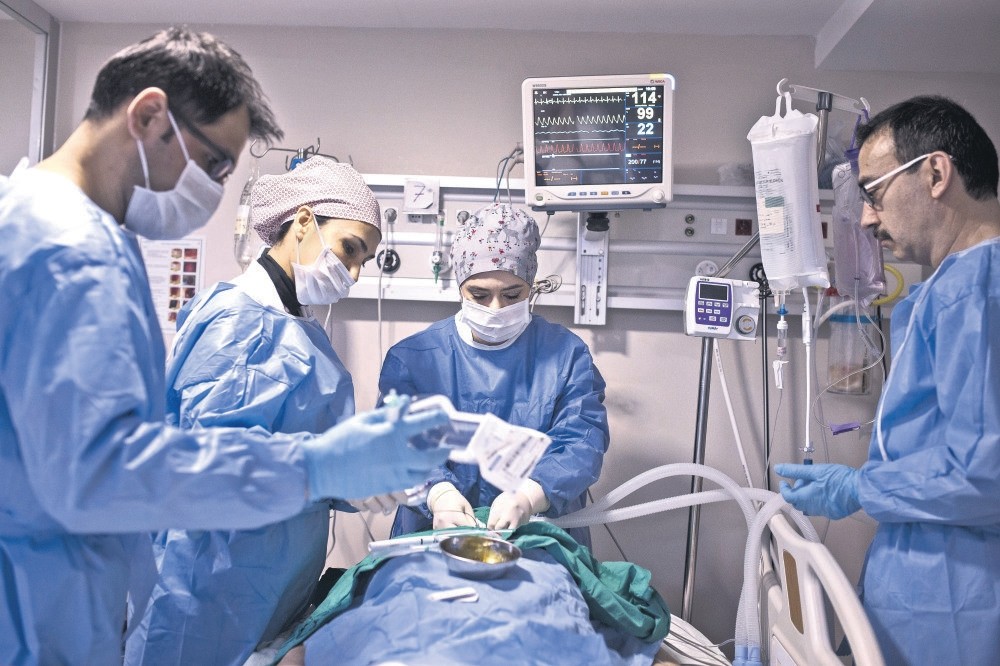
Doctors and nurses in intensive care units have one of the most challenging professions in the world. They work tirelessly on the thin line between life and death, but they go mostly unnoticed. Here is a chance to meet some of them and find out what it is like to work in the ICU
Fighting to save the lives of patients, the doctors and nurses in intensive care units (ICU) work day and night for hours, sometimes without any rest. As soon as the staff takes a step into the ICU, they do not know whether their shift will go on for 10 hours or 24 hours. They take care of the seriously ill and have no luxury in making mistakes.
Witnessing the most heart-breaking moments of children, youngsters and the elderly, intensive care unit personnel are among toughest people in the world.
Recently, Anadolu Agency (AA) was able to witness the tension and stressful work environment of the ICU.
More often than not it's hard for ICU doctors and nurses to even find time to rest or eat. One ICU doctor told AA that they try to keep their minds active by showing compassion toward the patients.
Devoting themselves to their jobs with the motto "We are not as helpless as the patients and their relatives," intensive care teams never forget that it is their duty to cure the patients.
In a statement to AA, Biruni University Hospital Anesthesiology and Reanimation Specialist Dr. Suna Koç said she spent the last decade of her career in the intensive care unit.
"In intensive care, we often encounter people who have come to the edge of life and are seriously ill. Besides the difficulty of doing this job, we also connect with the relatives of the patients. This is a process that is not easy for us. We get drained psychologically and sometimes physically," Koç said.
Noting that she loves her profession, Koç said that their biggest source of happiness is when they help a patient come back to life.
"It makes us very happy when we do something here for the patients who are on the shores of death and about to lose their lives," she said. "All I had in mind when I chose to study medicine was to help people. That's why I love my job."
When you are a staff member of the intensive care unit, your family has to adapt your working hours. This is no exception for Dr. Suna Koç and her family.
"We have to leave behind what we have experienced here but, we are humans after all and we can also be traumatized," she continued. "We are absolutely adversely affected by the young patients that we can't do anything about, but we try not to reflect this on our surroundings. Even if I get very sad and tired here, I try to leave everything behind."
To relieve the physical and physiological tiredness, the staff tries to find time to exercise and socialize outside the hospital.
"I am trying to become more socially available and do exercises outdoors. I also try to find more time for my family and children," Koç said. "It is very important for me to earn God's favor when I am doing my job. I do not only work behind the doors of the hospital: I try to be supportive to the people who have a patient in their family outside the hospital as well. Offering psychosocial support to the relatives of the patients is like a therapy to me. We need this as they need it. I believe that we will be so happy if we can be useful to people in any way, both in the world and in the hereafter."
Biruni University Hospital Head Physician and Anesthesiology and Reanimation Specialist Professor Dr. Türkan Özer also expressed her love for her profession.
"Physicians working in stressful work environments should absolutely love the job they are doing so that they can continue their career. I think this applies to all of us," she said. "There is a thrill to see the positive progress of the patients. There are times we call the hospital and ask about the patients' conditions. After we arrive at the hospital, we visit our patients one by one, get notifications about their general conditions, plan our treatments and do their examinations. There is a constant chain of information, everyone is aware of what is happening, and once we say something, the whole team is coordinated to handle it, there is a fast movement chain," Özer explained.
"We're active 24 hours a day. There is no concept of day and night here: the tasks to be performed within 24 hours are planned ahead. We do not have time for lunch, for example. Everyone completes their tasks and then takes break in a certain order at certain intervals," she continued. She underlined that as long as people love and professionalize their work, it is not a burden any more. "First of all, you have to love it. It is necessary to love humans, to love animals and to love everything that is alive. In fact, everything comes very easy with this love. Caution is also important. The ICU will not accept any mistakes. A mistake can cause major problems, so we always act with caution," Dr. Özer concluded.
